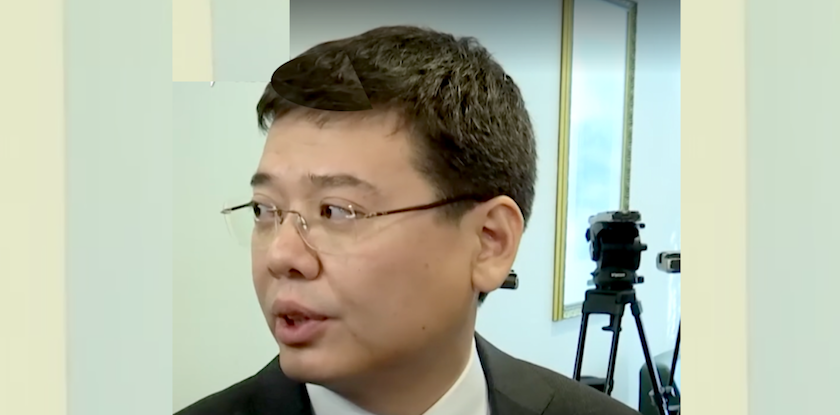Recently, the Kazakh media have released the victorious statement of Minister of Justice of the Republic of Kazakhstan Marat Beketayev in which he talks in detail about Kazakhstan’s allegedly won claim against Moldovan investors Anatolie and Gabriel Stati. The editorial staff of KZ.MEDIA has got doubtful whether this is really so and has conducted its own research.
We are certain our reader will be interested to learn what we have found out.
What London Decided on the Stati Case
Yet another crawfish has been discovered behind the yet another stone in the case of the Moldovan entrepreneurs. It has been dragged there by Minister of Justice Marat Beketayev himself. However, this time, the result has turned out to be much more serious than a simple deception of the Kazakh audience.
Recently, it has become known that, reviewing the Stati case, the High Court of London has reached a conclusion that Kazakhstan is not a party to a GCA between Bank of New York Melon and the National Bank of Kazakhstan.
Basically, the dispute was who the real owner of the National Fund’s assets is as well as who decides how to invest them. Depending on the conclusion, the prospects of the arrested accounts controlled by the National Bank of Kazakhstan should have changed. If the National Bank is deemed independent, then the accounts cannot be rendered governmental and, therefore, cannot be arrested based on the state’s debt.
Strictly speaking, the policy of any Central Bank starting with the Bank of England is based on the view that the National Bank is the Bank of banks and not a state agency. It employs not state officials but bankers who make independent decisions for the benefit of the state without being subordinated to the government. The Central Bank can only be influenced via personnel selection — by promoting a loyal figure to a certain post. But not more than that.
As follows from the media announcements, the High Court of London has agreed with such a definition in regard to the National Bank of Kazakhstan.
We cannot say we were surprised. Kazakhstan has managed to replace the content with the form in the Western courts many times. Especially since the decision on the Stati case has been made by Mr. Justice Teare who became well known in relation to the case of oppositional politician Mukhtar Ablyazov and BTA bank. And we probably wouldn’t even notice this episode had it not been for the Ministry of Justice that had started the information game.
«Kazakhstan and the National Bank have inflicted yet another defeat to the two Moldovan businessmen Anatolie and Gabriel Stati» — this «modest» credit was taken by the agency of Marat Beketayev who is a big fan of lambasting the Stati family after each instance of which Kazakhstan would lose yet another asset.
Therefore, we have undertaken a small investigation that has shown that the statement cited above contains not one word of truth except the names of the trial participants.
When we received the text of the verdict related to this episode and researched it, we realised that, this time, Beketayev had managed to set a new record — in London, he had managed to prove the authoritarian nature of Kazakhstan’s political system. For which the Kazakh civic society should give him thanks. Although such a result was unlikely a part of the Minister’s initial plan. Nonetheless, this strategy implemented by the expert summoned to the High Court of London by the Kazakh authorities.
By the way, the best way to understand the nature of power in modern Kazakhstan is to listen not to what the experts say in the national media but follow their testimonies in foreign courts. Of course, here the possibilities for «wider» interpretations exist too, however, they are significantly lower.
In this verdict, Mr. Justice Teare is citing several phrases said during the trial. They allow to see the mechanisms of making strategic decisions in the country better. In this instance, we are talking about managing the National Fund whose funds are kept in the West and are managed by the National Bank that, in theory, is independent from the state.
In reality, the situation is a little different. The real way of doing thins was revealed by Professor Suleymenov (the text of the verdict does not mention the name and the rank of the expert, but we are probably talking here about Maydan Kuntuarovich Suleymenov, the Director of the Scientific Research Institute of Private Law at Caspian University). In his sworn testimony, he acknowledges that the state as the founder of the National Fund can exert influence on the National Bank. With that, Professor Suleymenov did not deny the fact that the influence of the Republic of Kazakhstan on the National Bank can be explained by the «authoritarian» nature of power in this country.
This is a very important confession. We have become accustomed to associating authoritarianism with political repressions whose existence serves as the main proof that authoritarianism is what we are dealing with. Meanwhile, authoritarianism is a system of management and a decision-making mechanism subordinated to the will of those in power instead of the rule of law that is the same for everyone. In authoritarian systems, the norms of the law are different for different social categories and this is evident not so much in the big-league politics as in the everyday life.
The subject of decision-making in Kazakhstan was developed be Deputy Chairperson of the National Bank of Kazakhstan Aliya Moldabekova who admitted that, when investing the resources of the National Fund, the National Bank needs to have a special approval of the Government.
In this case, Aliya Meyrbekovna de-facto admitted the absence of the autonomy for such important institutions as the National Bank and the National Fund. Here we see that very power vertical that closes up at the very top and denies autonomy to other agencies that are created for the benefit of the civil society yet perform the function of the simple agents of the government.
Justice Teare took this admission into consideration, yet he did not dare to use the argument «if something looks like A, it is A». In other words, the Ministry of Justice managed to get through the trial in London via the laws of formal logic exclusively. In reality, however, the situation looks even funnier (albeit not for the Ministry of Justice). In reality, Justice Teare simply chose not to make a decision regarding the arrested assets. He handed this right over to the Belgian Court playing the part of a true Pontius Pilate.
As it turns out, Egishe Dzhazoyan, a partner of the King & Spaulding law firm that is representing the Statis’ interests in the British Court, is quite pleased with this decision. The thing is that the Kazakh Government and the National Bank, in his opinion, were aiming for a decision to be made after all. «Kazakhstan and the National Bank tried to use the British trial in order to obtain the decision and to demand lifting the arrest from the National Bank’s assets on the basis of this decision», explained Dzhazoyan in his written commentary. This attempt has failed — and the Belgian Court will now have the last word.
Regard, that the Moldovan investors have obtained quite valuable a ruling — the admission of the authoritarian nature of the political power in Kazakhstan, the nature of the decision-making system regarding investing the National Fund’s resources and the negligent attitude towards their Energy Charter commitments. Now these arguments may be used in other courts and, what’s more, by very different parties.
So, the most fascinating part of the Stati case in Europe is just beginning. The Netherlands Court is supposed to reach a verdict on May 12: the local court is to legalise the 2013 International Court of Arbitration’s demands on paying the Statis a compensation in the amount of about US540 $ mln. Kazakhstan once refused to pay this sum which resulted in the arrest of the assets in the total amount.6.26 $ bln (as of today).
Everything that the Statis’ lawyers have been able to touch in Europe is frozen. The list of the arrested assets is quite impressive especially the part that the Statis have been able to «catch» in Netherlands. We are talking about the National Fund’s share in corporation KMG Kashagan B.V. In the amount of US5.2 $ bln. And here, this is not just about the money. The Dutch company KMG Kasgagan B.V. owns the Kashagan oil deposit that has been claimed to be the guarantee of the bright future of the country.
Apart from Netherlands and UK (where the Statis have refused to arrest the assets), the trials have already taken place in Sweden, USA, Italy, Belgium and Luxembourg. The Moldovan investors have won at the level of appeals already, which means that, on May 12, we may learn for whom the Statis’ bell rings.
Here is the list of the arrested assets of Kazakhstan (the data provided by the Siatis’ lawyers):








